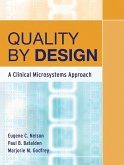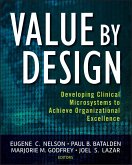The first comprehensive guide to the integration of Design for Six Sigma principles in the medical devices development cycle
Medical Device Design for Six Sigma: A Road Map for Safety and Effectiveness presents the complete body of knowledge for Design for Six Sigma (DFSS), as outlined by American Society for Quality, and details how to integrate appropriate design methodologies up front in the design process. DFSS helps companies shorten lead times, cut development and manufacturing costs, lower total life-cycle cost, and improve the quality of the medical devices. Comprehensive and complete with real-world examples, this guide:
_
Integrates concept and design methods such as Pugh Controlled Convergence approach, QFD methodology, parameter optimization techniques like Design of Experiment (DOE), Taguchi Robust Design method, Failure Mode and Effects Analysis (FMEA), Design for X, Multi-Level Hierarchical Design methodology, and Response Surface methodology
_
Covers contemporary and emerging design methods, including Axiomatic Design Principles, Theory of Inventive Problem Solving (TRIZ), and Tolerance Design
_
Provides a detailed, step-by-step implementation process for each DFSS tool included
_
Covers the structural, organizational, and technical deployment of DFSS within the medical device industry
_
Includes a DFSS case study describing the development of a new device
_
Presents a global prospective of medical device regulations
Providing both a road map and a toolbox, this is a hands-on reference for medical device product development practitioners, product/service development engineers and architects, DFSS and Six Sigma trainees and trainers, middle management, engineering team leaders, quality engineers and quality consultants, and graduate students in biomedical engineering.
Hinweis: Dieser Artikel kann nur an eine deutsche Lieferadresse ausgeliefert werden.
Medical Device Design for Six Sigma: A Road Map for Safety and Effectiveness presents the complete body of knowledge for Design for Six Sigma (DFSS), as outlined by American Society for Quality, and details how to integrate appropriate design methodologies up front in the design process. DFSS helps companies shorten lead times, cut development and manufacturing costs, lower total life-cycle cost, and improve the quality of the medical devices. Comprehensive and complete with real-world examples, this guide:
_
Integrates concept and design methods such as Pugh Controlled Convergence approach, QFD methodology, parameter optimization techniques like Design of Experiment (DOE), Taguchi Robust Design method, Failure Mode and Effects Analysis (FMEA), Design for X, Multi-Level Hierarchical Design methodology, and Response Surface methodology
_
Covers contemporary and emerging design methods, including Axiomatic Design Principles, Theory of Inventive Problem Solving (TRIZ), and Tolerance Design
_
Provides a detailed, step-by-step implementation process for each DFSS tool included
_
Covers the structural, organizational, and technical deployment of DFSS within the medical device industry
_
Includes a DFSS case study describing the development of a new device
_
Presents a global prospective of medical device regulations
Providing both a road map and a toolbox, this is a hands-on reference for medical device product development practitioners, product/service development engineers and architects, DFSS and Six Sigma trainees and trainers, middle management, engineering team leaders, quality engineers and quality consultants, and graduate students in biomedical engineering.
Hinweis: Dieser Artikel kann nur an eine deutsche Lieferadresse ausgeliefert werden.








